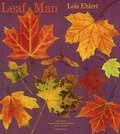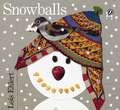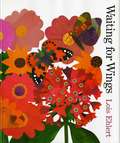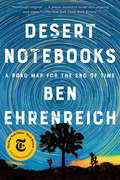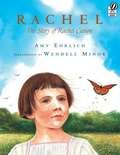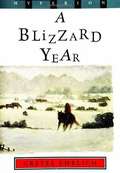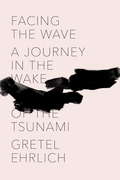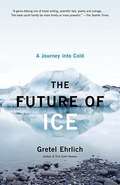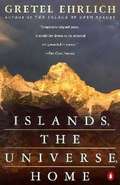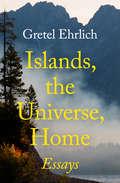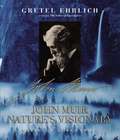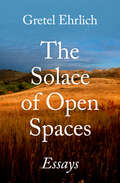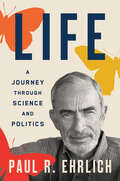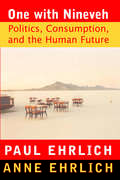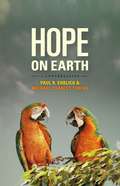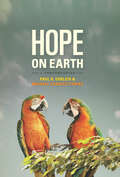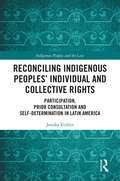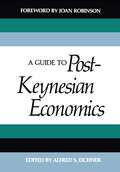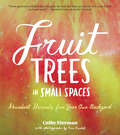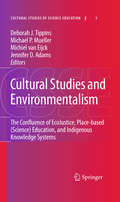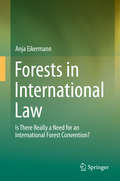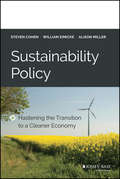- Table View
- List View
Regulation of Biological Control Agents
by Ralf-Udo EhlersThis book presents a comprehensive compilation of registration requirements necessary for authorisation of biological control agents (viruses, bacteria, fungi, active substances of natural origin and semiochemicals) in OECD countries. It also reviews data requirements for invertebrate agents (insect, mites and nematodes) and provides proposals for harmonisation of the regulation process and guidelines for completion of application forms. Based on results of the EU REBECA Policy Support Action, which gathered experts from academia, regulation authorities and industry, risks and benefits of the specific agents were reviewed and proposals for a more balanced registration process elaborated, including recommendations for acceleration of the authorisation process and discussions on trade-off effects and policy impacts. All these aspects are covered in detail in this book, which points the way forward for enhanced utilisation of biological control agents.
Eating the Alphabet Fruits and Vegetables from A to Z
by Lois EhlertAn alphabetical tour of the world of fruits and vegetables, from apricot and artichoke to yam and zucchini, including descriptions of 75 fruits and vegetables.
Leaf Man
by Lois EhlertRide the wind and drift east with Leaf Man in this autumnal classic by Caldecott Honor-winning author-illustrator Lois Ehlert, perfect for young readers returning to school in the fall. Fall has come, the wind is gusting, and Leaf Man is on the move. Is he drifting east, over the marsh and ducks and geese Or is he heading west, above the orchards, prairie meadows, and spotted cows? No one's quite sure, but this much is certain: A Leaf Man's got to go where the wind blows. Ehlert crafts each illustration out of actual fall leaves on every spread to reveal gorgeous landscapes. This playful and whimsical book celebrates the natural world and the rich imaginative life of children.
Planting a Rainbow (Fountas & Pinnell LLI Blue: Level F)
by Lois EhlertThis educational and enjoyable book helps children understand how to plant bulbs, seeds, and seedlings, and nurture their growth. Lois Ehlert's bold collage illustrations include six pages that present all the flowers of each color of the rainbow.
Snowballs
by Lois EhlertPull on your mittens and head outside with Lois Ehlert for a snowball day! Grab some snow and start rolling. With a few found objects, like buttons and fabric and seeds, and a little imagination, you can create a whole family out of snow. Ehlert uses collages of cut paper and vibrant, textured objects to dazzling effect in her tribute to building a snowman--and snowgirl and snowcat.
Waiting For Wings
by Lois EhlertEvery spring, butterflies emerge and dazzle the world with their vibrant beauty. But where do butterflies come from? How are they born? What do they eat--and how? With a simple, rhyming text and glorious color-drenched collage, Lois Ehlert provides clear answers to these and other questions as she follows the life cycle of four common butterflies, from their beginnings as tiny hidden eggs and hungry caterpillars to their transformation into full-grown butterflies. Complete with butterfly and flower facts and identification tips, as well as a guide to planting a butterfly garden, this butterfly book is like no other.
Desert Notebooks: A Road Map for the End of Time
by Ben EhrenreichLayering climate science, mythologies, nature writing, and personal experiences, this New York Times Notable Book presents a stunning reckoning with our current moment and with the literal and figurative end of time.Desert Notebooks examines how the unprecedented pace of destruction to our environment and an increasingly unstable geopolitical landscape have led us to the brink of a calamity greater than any humankind has confronted before. As inhabitants of the Anthropocene, what might some of our own histories tell us about how to confront apocalypse? And how might the geologies and ecologies of desert spaces inform how we see and act toward time—the pasts we have erased and paved over, this anxious present, the future we have no choice but to build? Ehrenreich draws on the stark grandeur of the desert to ask how we might reckon with the uncertainty that surrounds us and fight off the crises that have already begun.In the canyons and oases of the Mojave and in Las Vegas&’s neon apocalypse, Ehrenreich finds beauty, and even hope, surging up in the most unlikely places, from the most barren rocks, and the apparent emptiness of the sky. Desert Notebooks is a vital and necessary chronicle of our past and our present—unflinching, urgent—yet timeless and profound.
Rachel
by Amy EhrlichRachel Carson was always curious about the world around her. As a girl, she loved being outside, exploring and learning more about the universe. As an adult, Rachel wrote books, including Silent Spring, considered to be the start of today's environmental movement. An epilogue highlights on Rachel Carson's work and life.
A Blizzard Year: Timmy's Almanac of the Seasons
by Gretel EhrlichEhrlich ventures confidently into new terrain in her eloquent and affecting debut children's novel. Her prose, as pristine and spare as her snow-covered landscape, portrays the quiet drama of the changing seasons -- in both their consistency and unpredictability -- as well as a family attuned to nature's every nuance.
Facing the Wave: A Journey in the Wake of the Tsunami
by Gretel EhrlichA passionate student of Japanese poetry, theater, and art for much of her life, Gretel Ehrlich felt compelled to return to the earthquake-and-tsunami-devastated Tohoku coast to bear witness, listen to survivors, and experience their terror and exhilaration in villages and towns where all shelter and hope seemed lost. In an eloquent narrative that blends strong reportage, poetic observation, and deeply felt reflection, she takes us into the upside-down world of northeastern Japan, where nothing is certain and where the boundaries between living and dying have been erased by water. The stories of rice farmers, monks, and wanderers; of fishermen who drove their boats up the steep wall of the wave; and of an eighty-four-year-old geisha who survived the tsunami to hand down a song that only she still remembered are both harrowing and inspirational. Facing death, facing life, and coming to terms with impermanence are equally compelling in a landscape of surreal desolation, as the ghostly specter of Fukushima Daiichi, the nuclear power complex, spews radiation into the ocean and air. Facing the Wave is a testament to the buoyancy, spirit, humor, and strong-mindedness of those who must find their way in a suddenly shattered world.
The Future of Ice: A Journey into Cold
by Gretel EhrlichTo understand the complex, primal nature of cold, Ehrlich traveled to extreme points, from Tierra del Fuego to the Arctic circle. In this volume she reports on her experiences of the many expressions of cold--wind, water, snow and ice--and describes the history of these elements and of ocean currents and weather cycles. She attempts to uncover through her experiences the quintessential connection between humans and the physical world. Annotation ©2004 Book News, Inc. , Portland, OR (booknews. com)
Islands, the Universe, Home
by Gretel EhrlichA collection of deeply personal essays that illuminate the relationship between the human and the natural worlds by the acclaimed author of "The Solace of Open Spaces".
Islands, the Universe, Home: Essays
by Gretel EhrlichTen essays on nature, ritual, and philosophy “that are so point-blank vital you nearly need to put the book down to settle yourself” (San Francisco Chronicle). Gretel Ehrlich’s world is one of solitude and wonder, pain and beauty, and these elements give life to her stunning prose. Ever since her acclaimed debut, The Solace of Open Spaces, she has illuminated the particular qualities of nature and the self with graceful precision. In Islands, the Universe, Home, Ehrlich expands her explorations, traveling to the remote reaches of the earth and deep into her soul. She tells of a voyage of discovery in northern Japan, where she finds her “bridge to heaven.” She captures a “light moving down a mountain slope.” She sees a ruined city in the face of a fire-scarred mountain. Above all, she recalls what a painter once told her about art when she was twelve years old, as she sat for her portrait: “You have to mix death into everything. Then you have to mix life into that.” In this unforgettable collection, Ehrlich mixes life and death, real and sacred, to offer a stunning vision of our world that is both achingly familiar and miraculously strange. According to National Book Award–winning author Andrea Barrett, these essays are “as spare and beautiful as the landscape from which they’ve grown. . . . Each one is a pilgrimage into the secrets of the heart.”
John Muir: Nature's Visionary
by Gretel EhrlichIn this definitive photobiography, Ehrlich brings her award-winning grace and insight to the life of one of our nation's most prized environmental heroes--John Muir, a founder of the Sierra Club.
The Solace of Open Spaces: Essays
by Gretel EhrlichThese transcendent, lyrical essays on the West announced Gretel Ehrlich as a major American writer—“Wyoming has found its Whitman” (Annie Dillard). Poet and filmmaker Gretel Ehrlich went to Wyoming in 1975 to make the first in a series of documentaries when her partner died. Ehrlich stayed on and found she couldn’t leave. The Solace of Open Spaces is a chronicle of her first years on “the planet of Wyoming,” a personal journey into a place, a feeling, and a way of life. Ehrlich captures both the otherworldly beauty and cruelty of the natural forces—the harsh wind, bitter cold, and swiftly changing seasons—in the remote reaches of the American West. She brings depth, tenderness, and humor to her portraits of the peculiar souls who also call it home: hermits and ranchers, rodeo cowboys and schoolteachers, dreamers and realists. Together, these essays form an evocative and vibrant tribute to the life Ehrlich chose and the geography she loves. Originally written as journal entries addressed to a friend, The Solace of Open Spaces is raw, meditative, electrifying, and uncommonly wise. In prose “as expansive as a Wyoming vista, as charged as a bolt of prairie lightning,” Ehrlich explores the magical interplay between our interior lives and the world around us (Newsday).
Life: A Journey through Science and Politics
by Paul R. EhrlichA renowned scientist and environmental advocate looks back on a life that has straddled the worlds of science and politics “Entirely entertaining.”—Kirkus Reviews Acclaimed as a public scientist and as a spokesperson on pressing environmental and equity issues, delivering his message from the classroom to 60 Minutes, Paul R. Ehrlich reflects on his life, including his love affair with his wife, Anne, his scientific research, his public advocacy, and his concern for global issues. Interweaving the range of his experiences—as an airplane pilot, a desegregationist, a proud parent—Ehrlich’s insights are priceless on pressing issues such as biodiversity loss, overpopulation, depletion of resources, and deterioration of the environment. A lifelong advocate for women’s reproductive rights, Ehrlich also helped to debunk scientific bias associating skin color and intelligence and warned some fifty years ago about a possible pandemic and the likely ecological consequences of a nuclear war. This book is a vital contribution to literature focused on the human predicament, including problems of governance and democracy in the twenty-first century, and insight into the ecological and evolutionary science of our day. It is a must-read for anyone interested in understanding global change, our planet’s wonders, and a scientific approach to the present existential threats to civilization.
One With Nineveh: Politics, Consumption, and the Human Future
by Paul R. Ehrlich Anne H. EhrlichNamed a Notable Book for 2005 by the American Library Association, One with Nineveh is a fresh synthesis of the major issues of our time, now brought up to date with an afterword for the paperback edition. Through lucid explanations, telling anecdotes, and incisive analysis, the book spotlights the three elephants in our global living room-rising consumption, still-growing world population, and unchecked political and economic inequity-that together are increasingly shaping today's politics and humankind's future. One with Nineveh brilliantly puts today's political and environmental debates in a larger context and offers some bold proposals for improving our future prospect.
Hope on Earth: A Conversation
by Paul R. Ehrlich Michael Charles TobiasHope on Earth is the thought-provoking result of a lively and wide-ranging conversation between two of the world’s leading interdisciplinary environmental scientists: Paul R. Ehrlich, whose book The Population Bomb shook the world in 1968 (and continues to shake it), and Michael Charles Tobias, whose over 40 books and 150 films have been read and/or viewed throughout the world. Hope on Earth offers a rare opportunity to listen in as these deeply knowledgeable and highly creative thinkers offer their takes on the most pressing environmental concerns of the moment. Both Ehrlich and Tobias argue that we are on the verge of environmental catastrophe, as the human population continues to grow without restraint and without significant attempts to deal with overconsumption and the vast depletion of resources and climate problems it creates. Though their views are sympathetic, they differ in their approach and in some key moral stances, giving rise to a heated and engaging dialogue that opens up dozens of new avenues of exploration. They both believe that the impact of a human society on its environment is the direct result of its population size, and through their dialogue they break down the complex social problems that are wrapped up in this idea and attempts to overcome it, hitting firmly upon many controversial topics such as circumcision, religion, reproduction, abortion, animal rights, diet, and gun control. For Ehrlich and Tobias, ethics involve not only how we treat other people directly, but how we treat them and other organisms indirectly through our effects on the environment. University of California, Berkeley professor John Harte joins the duo for part of the conversation, and his substantial expertise on energy and climate change adds a crucial perspective to the discussion of the impact of population on global warming. This engaging and timely book invites readers into an intimate conversation with some of the most eminent voices in science as they offer a powerful and approachable argument that the ethical and scientific issues involved in solving our environmental crisis are deeply intertwined, while offering us an optimistic way forward. Hope on Earth is indeed a conversation we should all be having.
Hope on Earth: A Conversation
by Paul R. Ehrlich Michael Charles TobiasHope on Earth is the thought-provoking result of a lively and wide-ranging conversation between two of the world’s leading interdisciplinary environmental scientists: Paul R. Ehrlich, whose book The Population Bomb shook the world in 1968 (and continues to shake it), and Michael Charles Tobias, whose over 40 books and 150 films have been read and/or viewed throughout the world. Hope on Earth offers a rare opportunity to listen in as these deeply knowledgeable and highly creative thinkers offer their takes on the most pressing environmental concerns of the moment. Both Ehrlich and Tobias argue that we are on the verge of environmental catastrophe, as the human population continues to grow without restraint and without significant attempts to deal with overconsumption and the vast depletion of resources and climate problems it creates. Though their views are sympathetic, they differ in their approach and in some key moral stances, giving rise to a heated and engaging dialogue that opens up dozens of new avenues of exploration. They both believe that the impact of a human society on its environment is the direct result of its population size, and through their dialogue they break down the complex social problems that are wrapped up in this idea and attempts to overcome it, hitting firmly upon many controversial topics such as circumcision, religion, reproduction, abortion, animal rights, diet, and gun control. For Ehrlich and Tobias, ethics involve not only how we treat other people directly, but how we treat them and other organisms indirectly through our effects on the environment. University of California, Berkeley professor John Harte joins the duo for part of the conversation, and his substantial expertise on energy and climate change adds a crucial perspective to the discussion of the impact of population on global warming. This engaging and timely book invites readers into an intimate conversation with some of the most eminent voices in science as they offer a powerful and approachable argument that the ethical and scientific issues involved in solving our environmental crisis are deeply intertwined, while offering us an optimistic way forward. Hope on Earth is indeed a conversation we should all be having.
Reconciling Indigenous Peoples’ Individual and Collective Rights: Participation, Prior Consultation and Self-Determination in Latin America (Indigenous Peoples and the Law)
by Jessika EichlerThis book critically assesses categorical divisions between indigenous individual and collective rights regimes embedded in the foundations of international human rights law. Both conceptual ambiguities and practice-related difficulties arising in vernacularisation processes point to the need of deeper reflection. Internal power struggles, vulnerabilities and intra-group inequalities go unnoticed in that context, leaving persisting forms of neo-colonialism, neo-liberalism and patriarchalism largely untouched. This is to the detriment of groups within indigenous communities such as women, the elderly or young people, alongside intergenerational rights representing considerable intersectional claims and agendas. Integrating legal theoretical, political, socio-legal and anthropological perspectives, this book disentangles indigenous rights frameworks in the particular case of peremptory norms whenever these reflect both individual and collective rights dimensions. Further-reaching conclusions are drawn for groups ‘in between’, different formations of minority groups demanding rights on their own terms. Particular absolute norms provide insights into such interplay transcending individual and collective frameworks. As one of the founding constitutive elements of indigenous collective frameworks, indigenous peoples’ right to prior consultation exemplifies what we could describe as exerting a cumulative, spill-over and transcending effect. Related debates concerning participation and self-determination thereby gain salience in a complex web of players and interests at stake. Self-determination thereby assumes yet another dimension, namely as an umbrella tool of resistance enabling indigenous cosmovisions to materialise in the light of persisting patterns of epistemological oppression. Using a theoretical approach to close the supposed gap between indigenous rights frameworks informed by empirical insights from Bolivia, the Andes and Latin America, the book sheds light on developments in the African and European human rights systems.
A Guide to Post-Keynesian Economics
by Alfred S. EichnerDoes there exist an alternative to the “neoclassical synthesis” presented to students in introductory, intermediate, and advanced economics courses? The alternative is the post-Keynesian theory which is the subject of this book.
Fruit Trees in Small Spaces: Abundant Harvests from Your Own Backyard
by Colby EiermanLuscious peaches, crisp apples, and sweet plums right off the tree are hard to beat. For gardeners yearning for the pleasures of home-grown fruit plucked straight from the tree, this deliciously encouraging guide cuts the subject down to size. Colby Eierman, garden designer and fruit expert, shows how trees can easily be tucked into the tiniest spots and still yield a bumper crop of gorgeous fruit. Fruit Trees in Small Spaces covers everything a gardener needs to know about choosing and nurturing the most delicious small-space varieties, including selection, pruning, training, irrigation, and disease prevention. With inspiring ideas for spaces of all shapes and sizes and creative recipes for your incredible harvest, you'll want to plant a mini-orchard in every intimate corner. For the gardener with space limitations, bountiful fruit trees are now within arm's reach.
Cultural Studies and Environmentalism: The Confluence of EcoJustice, Place-based (Science) Education, and Indigenous Knowledge Systems (Cultural Studies of Science Education #3)
by Michiel Van Eijck Jennifer D Adams Michael P. Mueller Deborah J. TippinsAs the first book to explore the confluence of three emerging yet critical fields of study, this work sets an exacting standard. The editors' aim was to produce the most authoritative guide for ecojustice, place-based education, and indigenous knowledge in education. Aimed at a wide audience that includes, but is not restricted to, science educators and policymakers, Cultural Studies and Environmentalism starts from the premise that schooling is a small part of the larger educational domain in which we live and learn. Informed by this overarching notion, the book opens up ways in which home-grown talents, narratives, and knowledge can be developed, and eco-region awareness and global relationships can be facilitated. Incorporating a diversity of perspectives that include photography, poetry and visual art, the work provides a nuanced lens for evaluating educational problems and community conditions while protecting and conserving the most threatened and vulnerable narratives. Editors and contributors share the view that the impending loss of these narratives should be discussed much more widely than is currently the case, and that both teachers and children can take on some of the responsibility for their preservation. The relevance of ecojustice to this process is clear. Ecojustice philosophy is a way of learning about how we frame, or perceive, the world around us--and why that matters. Although it is not synonymous with social or environmental justice, the priorities of ecojustice span the globe in the same way. It incorporates a deep recognition of the appropriateness and significance of learning from place-based experiences and indigenous knowledge systems rather than depending on some urgent "ecological crises" to advocate for school and societal change. With a multiplicity of diverse voices coming together to explore its key themes, this book is an important starting point for educators in many arenas. It brings into better focus a vital role for the Earth's ecosystems in the context of ecosociocultural theory and participatory democracy alike. "Encompassing theoretical, empirical, and experiential standpoints concerning place-based knowledge systems, this unique book argues for a transformation of (science) education's intellectual tradition of thinking that emphasizes individual cognition. In its place, the book offers a wisdom tradition of thinking, living, and being that emphasizes community survival in harmony within itself and with Mother Earth." Glen Aikenhead
Forests in International Law
by Anja EikermannThis book investigates the potential need for an international convention on forests and establishes a multifunctional concept of forests as a cornerstone for international forest regulation. Accordingly, it examines a variety of international instruments pertaining directly or indirectly to forests and explores their entangled, fragmented nature. While contending that the lack of consistency in international law impedes the development of a stand-alone international forest convention, at the same time it argues that the lessons learned from fragmentation as well as from the history of forest discourse on the international level open up new options for the regulation of forests in international law, based on (new) concepts of coordination and cooperation.
Sustainability Policy
by William Eimicke Alison Miller Steven CohenA complete guide to sustainability policy at the federal, state, and local levelsSustainability Policy: Hastening the Transition to a Cleaner Economy is a fundamental guide for public sector professionals new to sustainability policy development, implementation, strategy, and practice. Featuring detailed cases highlighting innovative sustainability initiatives, this book explores the elements that constitute effective policy, and the factors that can help or hinder implementation and adoption. Readers gain insight into policies in effect at the federal, state, and local levels, in the areas of water, energy, material use, and waste management, and the reasons why local policies are often the most innovative and successful. Discussion surrounding monitoring and measurement addresses the lack of standardization, as well as the government's critical role in leading the field toward generally accepted sustainability metrics, while outlining the reasons why certain policies are more feasible than others.This book is an introductory resource, written in non-technical language, and organized in a coherent manner that establishes foundational knowledge before introducing more complex issues. Even readers with little background in sustainability will gain insight into the current state of the field and the issues at hand.Understand sustainability in public and private enterprises, including the role of government and public policyLearn the current standing federal, state, and local policies surrounding sustainabilityDiscover what makes an effective sustainability policy, including measurement and evaluation metricsExplore the politics and future of sustainability, and the barriers to changeSustainability is a hot topic in both the public and private sector, with vocal advocates on both sides of every issue, so developing effective policy is crucial. For public sector professionals entering the sustainability field, Introduction to Sustainability Policy & Management is a valuable resource.


